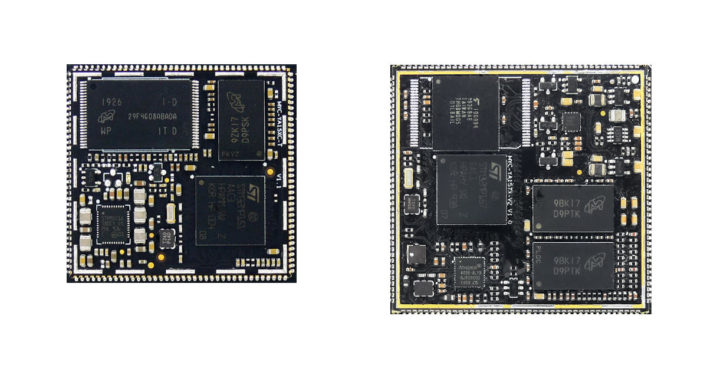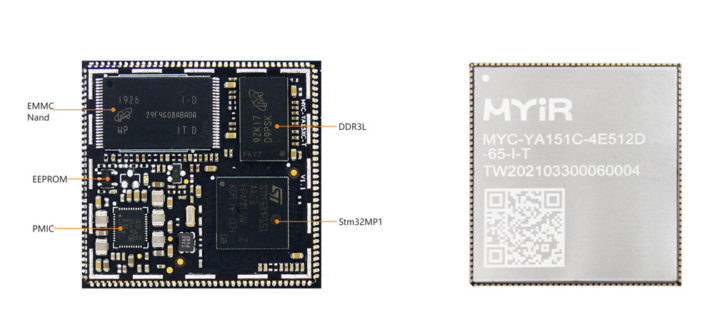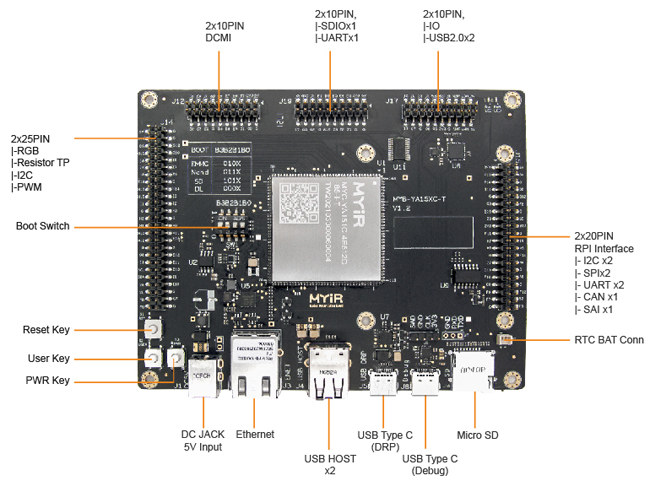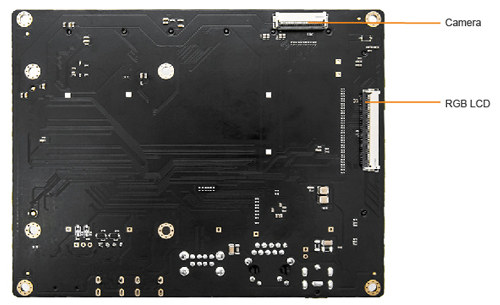MYIR launched a fairly compact SoM and accompanying development board based on STM32MP1 Cortex-A7 microprocessor in January 2020. But apparently, the 45mm by 43mm MYC-YA157C module was too big (or expensive) for some customers, so the company has now designed a smaller STM32MP1 SoM with MYC-YA157C-T measuring just 39mm by 37mm thanks to the removal of the Ethernet PHY.
MYC-YA15XC-T STM32MP1 system-on-module

Specifications:
- SoC (one or the other)
- STM32MP151AAC3 single-core Cortex-A7 processor up to @ 800 MHz with Cortex-M4 core @ 209 MHz
- STM32MP153AAC3 dual-core Cortex-A7 processor up to @ 800 MHz with Cortex-M4 core @ 209 MHz, and CAN FD interface
- STM32MP157AAC3 dual-core Cortex-A7 processor up to @ 800 MHz, with Cortex-M4 core @ 209 MHz, 3D GPU, DSI display interface, and CAN FD
- Two configurations for memory and storage
- 256MB DDR3L, 256MB Nand Flash, 32KB EEPROM or
- 512MB DDR3L, 4GB eMMC Flash, 32KB EEPROM
- 148-pin stamp hole expansion interface (1.0mm pitch )
- Display I/F – 16-/18-/24-bit RGB Interface up to 1366 x 768 @ 60fps
- Networking – 1x RGMII interface
- USB – 2x USB Host or 1x USB Host plus 1x USB OTG
- Up to 8x Serial ports
- Up to 5x I2C, 4x SPI
- Up to 16x ADC
- 2x SDIO
- 2x CAN (only for STM32MP153 and STM32MP157)
- 5x LPTIM and 10 TIM
- Up to 109 x GPIOs
- Power Management IC – STPMIC1APQR
- Power supply – 5V/0.5A
- Dimensions – 39 x 37mm (10-layer PCB design)
- Temperature Range – Commercial: 0~70°C or industrial -40~85°C

The module is especially suited to industrial control, consumer electronics, smart home, medical devices, and the company provides Linux 5.4.31 and the source code for the necessary drivers.
While MYC-YA15XC-T CPU is the smallest STM32MP1 system-on-module from MYIR Tech, other have designed even smaller module including NanoSOM nS02 (25.4 x 25.4 x 3 mm), and if you really need something as compact as possible Octavo Systems OSD32MP15x system-in-package comes with STM32MP1 processor, up to 1GB RAM, and the PMIC in just an 18x18mm footprint, albeit with eMMC flash storage.
MYD-YA15XC-T Development Board

To quickly get started with the module, MYIR also offers the MYD-YA15XC-T development board with the following key features:
- System-on-module – MYIR MYC-YA15XC-T described above
- Storage – MicroSD card slot
- Display I/F
- 50-pin FPC connector for LCD display up to 1366 x 768 @ 60fps. Supports MYIR’s MY-LCD70TP-C LCD Module with capacitive touch screen
- 50-pin 2.54mm pitch header RGB/TP Extension Interface
- HDMI via MYIR’s MY-RGB2HDMI Module through the LCD interface
- Camera I/F
- 30-pin FPC connector for MYIR’s MY-CAM011B camera module
- 20-pin 2.54mm pitch expansion header with MIPI CSI
- Networking – Gigabit Ethernet port via AR8035
- USB – 2x USB 2.0 host ports, 1x USB Type-D
- Expansions
- 40-pin Raspberry Pi (mostly) compatible header with 2x SPI, 2x UART, 2x I2C, 1x CAN, 1x SAI
- 20-pin header with 2x USB, 2x ADC, GPIOs
- 20-pin header with 1x SDIO, 2x UART
- Debugging – USB-C port for UART/serial console
- Misc – 2 x LEDs (power and system), 3x buttons (power, reset, user), and RTC battery header
- Power Supply – 5V via a power barrel jack
- Dimensions – 137 x 105 mm

Besides the camera and display modules, the company can also provide other expansion boards such as an LCD to HDMI module, the MY-WIREDCOM RPI module to extend CAN, RS485, and RS232 functions through the Raspberry Pi header, as well MY-WF005S WiFi/BT module connected via the header with SDIO.
Pricing and availability
MYIR offers four main variants of MYC-YA15XC-T STM32MP1 system-on-module with a combination of memory, storage, and temperature range options. But since it’s possible to select STM32MP151, STM32MP153, or STM32MP157, there’s a wider range of options than the table above implies. Pricing starts at $20 per unit for the entry-level module based on STM32MP151, with 256MB RAM, 256MB NAND flash, and a commercial temperature range. The STM32MP151 development board is sold for $69 or $79 depending on the select memory/storage option.
You’ll find more details, including hardware documentation, and the online store to order the module, development board, and accessories on MYIR’s website.

Jean-Luc started CNX Software in 2010 as a part-time endeavor, before quitting his job as a software engineering manager, and starting to write daily news, and reviews full time later in 2011.
Support CNX Software! Donate via cryptocurrencies, become a Patron on Patreon, or purchase goods on Amazon or Aliexpress





